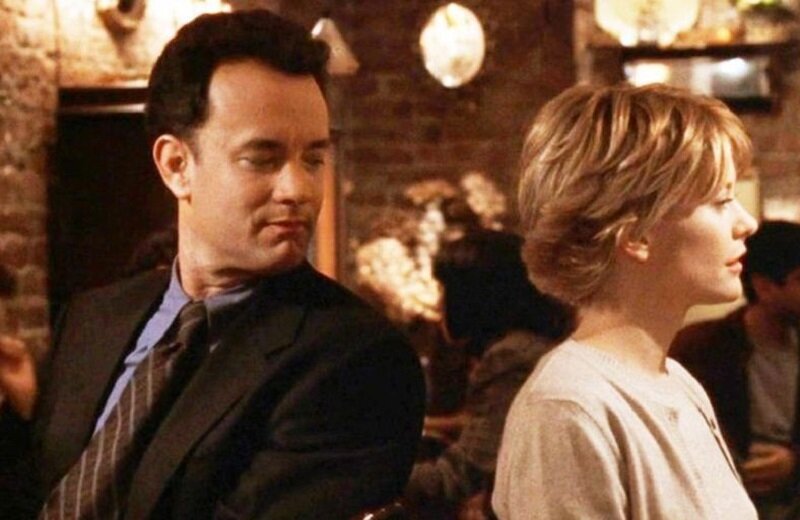The Politics of You've Got Mail Are More Sinister Than You Remember
You’ve Got Mail. Image courtesy of Warner Bros.
You’ve Got Mail may be the quintessential 90s rom-com. Starring America’s Sweethearts Tom Hanks and Meg Ryan, it is loaded with hallmarks of the bygone era that was Bill Clinton’s America: e-mail, a TRON-esque opening sequence, Greg Kinnear, meet-cutes, books, the upbeat triumph of love over adversity. Oh yeah, and it’s also about a corporate behemoth that bulldozes small businesses into bankruptcy and far from being the villain of this story, the corporate overlord is the improbable heart-melting hero.
So for those of you who don’t remember, You’ve Got Mail was a very popular 1998 rom-com from Nora Ephron which decided to use this new thing called e-mail as a narrative device for an unlikely couple to come together and find love in their diversity. Meg Ryan plays a local New York bookshop owner. Even though she’s in a relationship with Greg Kinnear she goes into an over 30s AOL chat room to talk to predatory strangers on the internet.
In this way she meets Tom Hanks online, but doesn’t know his IRL identity or that he owns a mega bookstore chain in the same neighborhood which is driving her little shop out of business. Now, you may start to think that this is setting things up for her to change him somehow and bring him around to understanding that small businesses are the backbone of America or for her underdog shop to stand up against the interests of corporate America and win out over the wealthy elites. But, you would be wrong.
Instead, Tom Hanks and his corporate chain drive Meg Ryan’s neighborhood bookshop out of business. And, that’s it. Everyone working there loses their job. In the end our two star-crossed lovers reveal their true identities to one another, and live happily ever after in a fog of romance. The message of this film, aside from encouraging somewhat risky behavior on the internet, is that it’s fine for corporate giants to drive small shops out of business. In fact, it’s not only fine it is desirable. In fact, if you do it the person whose livelihood you just ruined will fall in love with you!
Needless to say, this message is kind of messed up. But you have to cast yourself 22 years into the past, back to 1998. This was the apotheosis of the Clinton Years, the neoliberal fever dream to improve consumer welfare through never-ending, ever-larger corporate mergers. Small business was a relic of the past, we were told. Get bigger. Get cheaper. Get more efficient. Indeed, in a case of life imitating art in a kind of weird way, AOL which provides the plot device of the film, would finalize a merger with Time Warner, the studio behind You’ve Got Mail, just a few years later. Everything in this movie is thus a rather naked fetishization of the corporate ethos which was then ascendant in America.
And the really odd thing, as I watched the movie now and look back on it through the prism of history, is how everyone - the film grossed $251 million so a lot of people saw it - just sort of accepted this message that it was inevitable for all life on Earth to be increasingly consolidated in the hands of a few corporate mega-giants. That ideology had simply floated into and permeated our society and how we understood our place in, to the point where the movie treats it as quite normal.
Now, with that in mind a fun thought experiment - if they remade You’ve Got Mail today and cast Jeff Bezos as Tom Hanks would society react with the same kind passive acceptance or would we recognize the message of such a movie to be kind of gross?






